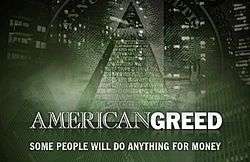American Greed
American Greed, also known as American Greed: Scams, Scoundrels, And Suckers and as American Greed: Scams, Schemes, And Broken Dreams, is an original primetime series airing on the business news network CNBC.[1][2] It was created by Mark Hoffman president, CEO, and chairman of the board at CNBC. The program is narrated by Stacy Keach Jr..[3] It first aired on June 21, 2007, in the US and is currently airing in its thirteenth season.[4] Episodes are also rebroadcast on the television network Escape.
| American Greed | |
|---|---|
 | |
| Genre | Documentary |
| Narrated by | Stacy Keach |
| Country of origin | United States |
| Original language(s) | English |
| No. of seasons | 13 |
| No. of episodes | 176 & 3 Specials (list of episodes) |
| Production | |
| Executive producer(s) | Sharon Barrett Charles Schaffer |
| Producer(s) | Kurtis Productions |
| Production location(s) | Chicago, Illinois |
| Release | |
| Original network | CNBC |
| Original release | June 21, 2007 – Present |
| External links | |
| Website | |
Subjects
The business-reality program focuses on the stories behind high-profile corporate and white collar crimes betrayals and scams in American history, including the financial scandals involving WorldCom,[5] HealthSouth,[6] Tyco International,[7] and CyberNET.[8] In addition, stories feature low-profile financial crimes affecting individual investors and smaller companies, including various Ponzi schemes, real estate and other investment frauds, bank robbery, identity theft, medical fraud, embezzlement, insurance fraud, murder-for-hire, art theft, credit card fraud, money laundering, and crimes committed by elected officials.[1]
In addition, there have been 3 American Greed special presentations: American Greed Special: Bernie Madoff Behind Bars;[9] American Greed: Special Presentation: 9/11 Fraud - “A Contractor Capitalizes on Disaster";[10] and Mob Money: an American Greed Special Presentation.[11]
Episodes
The show began airing its thirteenth season in January, 2019.
Companion series
In August 2012 CNBC aired the series American Greed: The Fugitives which focused on active cases of alleged white-collar crime. The show documented stories of suspects who were still at large and had continued to evade authorities.[12] It lasted 2 seasons, covering 13 cases of financial crimes.[13] After the Nov. 14, 2013, airing of American Greed: The Fugitives #12, viewer tips led to the successful Nov. 26, 2013, arrest of FBI Most Wanted fugitive David Kaup, who had been a fugitive since Dec. 17, 2012, when he failed to appear for sentencing in Los Angeles.[14][15]
In early 2019, CNBC aired another companion series, American Greed: Deadly Rich, which focused on high-profile murder cases involving the wealthy.
Criticisms
The show has been criticized for the portrayal of law enforcement's interest and involvement in combating fraud, citing that many frauds were discovered only after a number of people had already been victimized; e.g., the largest fraud, Bernie Madoff's $65 billion Ponzi scheme, ended only after he confessed. In civil fraud claims, courts require that the fraud be pleaded with specificity and the proponent provide documentation corroborating the claim.[16] In the Madoff case, an early administrative complaint was dismissed for lack of evidence, with the claim of a Ponzi scheme deemed speculative and unsubstantiated using essentially the same standard federal courts employ in evaluating civil fraud claims.[17]
References
- Goldman, Beth (June 11, 2007). "CNBC's "American Greed: Scams, Scoundrels and Scandals" To Premiere on Thursday, June 21st". www.cnbc.com.
- "American Greed". CNBC. February 3, 2012.
- http://www.robertfeder.com/2015/02/18/bill-kurtis-for-us-greed-has-been-good/
- https://www.moviefone.com/tv/american-greed/178448/season-11/%5B%5D
- Keach, Stacy. "American Greed: Inside the WorldCom Scam | DHS: Department of Hollywood Scams". www.cnbc.com.
- Keach, Stacy. "American Greed: A Wall Street Wonder Takes a Fall". www.cnbc.com.
- Keach, Stacy. "American Greed: Party's Over: Tyco's Kozlowski". www.cnbc.com.
- Keach, Stacy. "American Greed: Fraud in Cyberspace". www.cnbc.com.
- Keach, Stacy. "American Greed Special: Bernie Madoff Behind Bars". www.cnbc.com.
- "American Greed: Special Presentation: 9/11 Fraud - "A Contractor Capitalizes on Disaster"". www.cnbc.com.
- "Mob Money: An American Greed Special Presentation" – via www.imdb.com.
- "The Power of 'Greed'". HuffPost. August 13, 2012.
- "American Greed: The Fugitives: Seasons". www.cnbc.com.
- CNBC, Celia Watson Seupel, Special to (December 4, 2013). "A capture after 'American Greed: The Fugitives' profile". CNBC.
- "Fugitive Who Failed to Appear for Sentencing for Carrying Out a Multi-Million-Dollar Scheme That Defrauded Homeowners Arrested in Las Vegas". FBI.
- Fed. R. Civ. Pro 9 content
- content
- Matulich, Serge; Currie, David (June 2008). "Richard Scrushy: The Rise and fall of the King of Health Care". Handbook of Frauds, Scams, and Swindles: Failures of Ethics in Leadership (Illustrated ed.). CRC Press. pp. 315–351. ISBN 978-1-4200-7285-3. OCLC 214285931. Retrieved 2009-05-19.
- Jennings, Marianne (August 2006). "Innovation Like No Other". The Seven Signs of Ethical Collapse (annotated ed.). New York: St. Martin's Press. pp. 214–216. ISBN 0-312-35430-4. OCLC 63297926.
- Markham, Jerry (December 2005). "Full Disclosure Fails". A Financial History of Modern U.S. Corporate Scandals: From Enron to Reform (illustrated ed.). Armonk, N.Y: M.E. Sharpe. pp. 360–364. ISBN 0-7656-1583-5. OCLC 58536658.
1. Fed.R. Civ. Pro 9.
2. Ashcroft v. Iqbal, 556 U.S. 662 (2009).